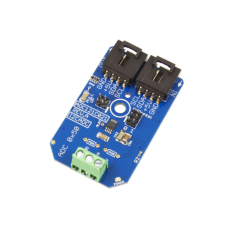ADC121C021 1-Channel 12-Bit Analog to Digital Converter ADC I2C Mini Module
The ADC121C021 Analog-to-Digital Converter (ADC), from Texas Instruments, is one of our favorites. We use it in many of our analog I2C mini modules, including our very popular gas sensors. The ADC121C021 offers 12-bits of resolution across a 0 – 5VDC voltage range. With over 188,000 samples per second, this little ADC is fast! Perhaps our favorite feature is the addressing system. This chip supports floating addressing–so you can share up 9 devices on a single I2C port with just 2 jumpers. We packaged this device into a convenient I2C Mini Module footprint, making it easy to plug in and use. This I2C Mini Module include open holes for Pull-Up and Pull-Down resistors for applications that require input bias. This little ADC is suitable for just about any analog-to-digital conversion application and will likely be the focus of many of our future products for many years to come.
Example Applications
Most analog sensors provide a resistive output. Using this ADC, these sensors can easily be adapted to the NCD I2C bus standard, offering the ability to link several sensors together for digital access. Use for IoT sensing applications with your favorite platform, including Particle, Arduino, Raspberry Pi, and much more. Combine with our USB to I2C Converter to connect this ADC to your computer (Use our Free AnyI2C Software for Testing and Communications). Chain several of these modules together and connect different types of analog sensors. Simplify your code by learning and working with only the ADC121C021 for all sensor types. We have tested this ADC with analog light sensors, thermistor, flex sensors, variable resistors, and much more with excellent results. On-board openings allow installation of optional pull-up and pull-down resistors for the on-board Analog input. I2C Termination jumpers allow pull-up of the I2C bus. Includes 3-terminal connector for easy access to the on-board ADC.
What is the NCD I2C Interface?
NCD is the creator of plug and play modular hardware using the NCD I2C Interface connector standard. NCD I2C devices allow you to chain together several devices on the I2C bus, and communicate to each device individually at high speed (subject to the limitations of I2C). The NCD I2C Interface uses a standard 4-Pin I2C Input and I2C Output connector. NCD I2C devices communicate 5V I2C data and provides 5V DC power through this connector. NCD I2C devices use standard I2C communications for all data transport, which is supported by nearly every microcontroller in production today. The NCD I2C Interface is strictly a 5V standard, which is ideal for transport across longer cables. NCD I2C devices always include a 6″ (152mm) 4-conductor I2C cable. NCD I2C Mini Modules always include a 3″ (76mm) 4-conductor I2C cable. Cables and connectors are available separately for designers who would like to include their own NCD I2C Interface into their designs.
Plug and Play Connectivity
NCD I2C devices will plug in to any available NCD I2C Output. This includes just about everything we make in the NCD IoT Category, including all NCD IoT devices. We also manufacture a wide range of I2C adapters that make it easy to plug NCD I2C Devices directly into most computing platforms. The NCD I2C Interface adapters are available for Arduino, Banana Pi, BeagleBone, Bluz, C.H.I.P., ESP8266, Onion Omega, Particle Photon and Electron, PyCom, Raspberry Pi, 2, 3, and Zero, and Windows. We are always working to add new platform support for NCD I2C devices. NCD I2C Interface devices are compatible with just about everything in the microcontroller industry.
Unlimited I2C Expansion
Based on our plug-and-play I2C interface standard, all NCD I2C devices are equipped with a I2C output port, making it easy to expand to a wide variety of sensors, current monitors, relay controllers, PWM controllers, and much more! We are always designing new expansions for our modular plug-and-play I2C framework. We are dedicated to building a product line of interconnected devices to simplify all forms of automation. Re-use or upgrade your hardware in seconds by selecting the modules that best fit your needs, and chaining them together using the included I2C expansion cables!
Powering NCD I2C Interface Devices
Some NCD I2C devices require a external power supply, others may be powered through the 4-Pin I2C bus connector at 5VDC, and other devices are jumper selectable between external and I2C bus power. All I2C mini modules are powered through the 5V I2C bus connector, greatly simplifying connectivity.
Features
- ADC121C021 from Texas Instruments
- 1-Channel 12-Bit Analog to Digital Conversion
- Single-Ended 0 to 5VDC Analog Input
- 188.9K Samples per Second
- Up to 9 Devices per I2C Port
- I2C Mini Module Form-Factor
- Includes I2C Cable
- 0x50 I2C Start Address
Enter the code in the box below:


